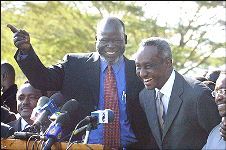Khartoum, main southern rebels set to sign final deals to end war
NAIROBI, Dec 31 (AFP) — Khartoum and the main southern rebel group are Friday set to sign accords on the two last issues in their lengthy peace talks to pave the way for signing a comprehensive peace deal to end Africa’s longest-running conflict.

|
|
Sudanese Vice-president Ali Osman Taha (R) and Sudan People Liberation Army (SPLA) rebel leader John Garang. Khartoum and the main southern rebel group are Friday set to sign accords on the two last issues in their lengthy peace talks to pave the way for signing a comprehensive peace deal to end Africa’s longest-running conflict (AFP). |
The way was cleared on Thursday after Sudan’s Vice President Ali Osman Taha and Sudan People’s Liberation Movement/Army (SPLM/A) leader John Garang clinched accords on a permanent ceasefire and on details of how the final peace agreement would be implemented.
A permanent ceasefire will enter into force on January 9, the day a comprehensive final peace deal will be signed in the Kenyan capital, Nairobi.
The latest agreements mark the end of sticking points in the peace talks, which started in Kenya in early 2002, and pave the way for the drafting and eventually signing of the much awaited agreement to end 21 years of fighting in southern Sudan.
The two sides pledged last month in writing before the UN Security Council to sign a final peace deal by year-end.
Since July 2002, both sides have managed to agree on protocols on granting the south the right to self determination after six years of self-rule, power and wealth-sharing, management of national security and administration of disputed regions in the centre of the country during the post-conflict interim period.
The countdown to six years of the south’s self rule starts six months from the day it is signed.
Garang and Taha have been meeting since they joined the talks in Naivasha on September 2003, after low-level delegates failed to move forward.
The Sudan war erupted in 1983 when the southern rebels rose up against Khartoum to end Arab and Muslim domination and marginalisation of the black, animist and Christian south.
The war and its effects have killed at least 1.5 million people and displaced four million others in the former British colony that got its independence in 1956.
The agreement does not cover a separate conflict in Sudan’s western Darfur region which flared up in February 2003, when rebels from minority tribes launched a revolt against Khartoum, demanding an equal share of national development.
The conflict has so far claimed 70,000 lives and displaced 1.6 million people amid rampant human rights violations that have prompted the United Nations to describe the clashes as the world’s worst humanitarian crisis.
